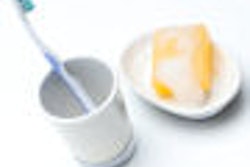Toothpaste and mouthwash flavors can be so ho hum. Crest, for example, offers Peppermint. Also Strong Mint, Mild Mint, Vanilla Mint, Citrus Clean Mint, and Mint + Green Tea Extract. Did we mention mint? Colgate's not much more imaginative with its Max Fresh Clean Mint, Cool Mint, Cinnamint, and Kiss Me Mint. Why does everything have to be so darn refreshing? Why not garlic toothpaste washed down with an olive oil rinse?
You may laugh, but that's the serious suggestion from separate groups of researchers who have looked into the dental benefits of these common cooking ingredients. Researchers who aren't even Italian.
The garlic investigators hail from Shiraz University in Shiraz, Iran, a country where the widespread use of the antibiotic erythromycin has led to drug resistance among some pretty noxious bacteria -- including the infamous caries-causing S. mutans. Garlic has starred in centuries of folk remedies, and has been proven in laboratories to knock out heavy-hitting bacteria.
So the Shiraz researchers thought they'd try it on strains of S. mutans cultivated from extracted teeth and known to be resistant to multiple types of antibiotics. Sure enough, the bacteria keeled over, the researchers report in the October-December issue of the Journal of the Indian Society for Pedodontics and Preventative Dentistry.
Meanwhile, a team from the University of Zürich, Switzerland, and the Georg-August-University of Göttingen, Germany, set out to explore the benefits of olive oil -- which has also shown some antibacterial talent in previous experiments. For a study in the fall issue of Acta Odontologica Scandinavica, they dunked bits of cow teeth in various solutions of the oil, stored them in artificial saliva, then tried to dissolve them in citric acid. They found that 100 percent olive oil didn't protect the samples from the effects of the acid, but a 2 percent olive oil emulsion (or a 2 percent olive-oil-containing saliva substitute, Xerostom), slowed corrosion significantly.
Olive oil didn't work quite as well as fluoride, the researchers found, but that hasn't deterred the Spanish makers of Xerostom, Biocosmetics Laboratories, from touting olive oil as one of their product's special ingredients.
Likewise, the garlic extract in the Shiraz experiment didn't kill bacteria quite as easily as the standard oral antibacterial chlorhexidine. But that didn't discourage the team from taking their project to the next stage: "Work is in progress at the medical center," they write, "for standardization and preparation of toothpaste and mouthwash containing this antimicrobial agent."
At last we may be able to find on our local drugstore shelves such flavors as Toothpesto, Strong Vanilla Citrus Cinnaolive, and of course, Kiss Me Garlic.



















